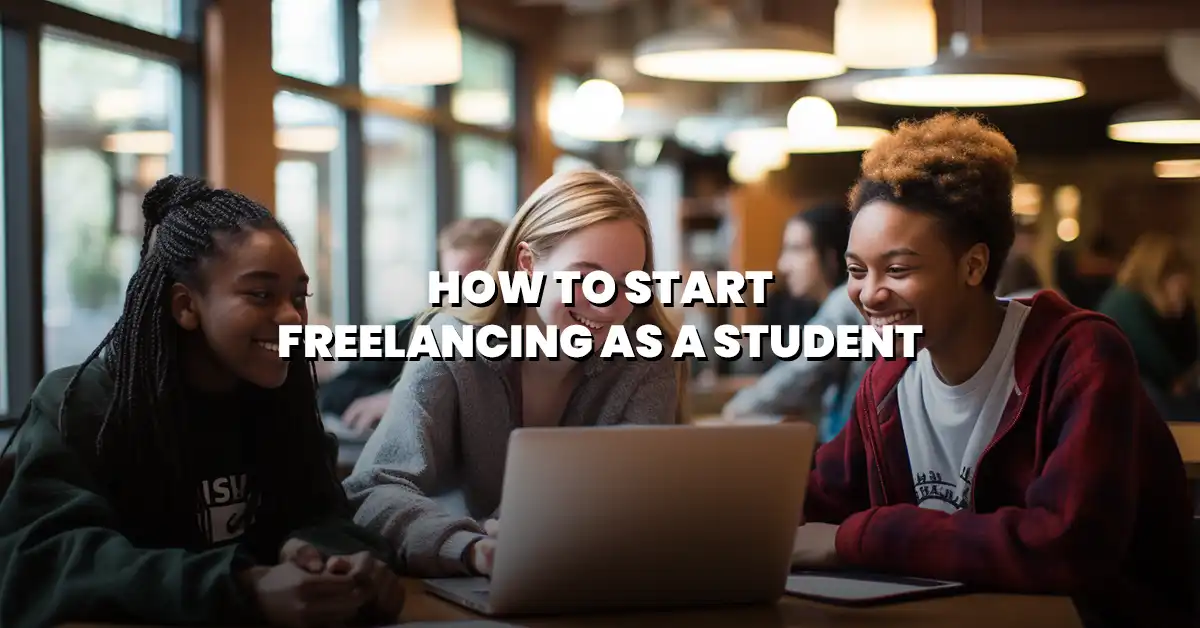
“Imagine getting paid while cramming for your finals – sounds too good to be true? It’s not.” If balancing school, social life, and a side hustle seems like a mission impossible, I’m here to tell you that freelancing with zero experience or as a student is more than doable. The best part? You don’t need tons of expertise or experience to get started. You just need a little hustle and some Wi-Fi.
Why Freelancing is the Perfect Student Gig
Let’s be real – traditional part-time jobs can be a pain. Clocking in, fixed schedules, boring tasks – who’s got time for that? Freelancing flips the script. You choose the gigs, work on your own time, and pick jobs that don’t feel like pulling teeth. Whether you’re looking to stack up some extra cash for weekend plans or want to build a portfolio that’ll make your future boss double-take, freelancing fits right into your student lifestyle.
Picking the Right Hustle: The Easy Jobs for Students

Freelancing doesn’t have to be a grind. There are tons of beginner-friendly jobs that are perfect for students juggling lectures and deadlines. Here are some remote gigs that don’t require you to be an expert:
- Social Media Management: Love scrolling through Instagram or TikTok? Brands and small businesses need people who “get it” to manage their accounts, post content, and engage with followers. You’re already online – why not get paid for it?
- Content Writing: You don’t have to be Shakespeare to write blog posts, product descriptions, or social media captions. Many companies need quick, casual content – something students are naturally good at.
- Graphic Design with Canva: Even if you’re not a pro with Photoshop, Canva is a lifesaver. You can whip up simple logos, social media graphics, or presentations without needing advanced design skills.
- Virtual Assistant: If you’re organized and good with schedules, being a virtual assistant is like being someone’s right hand. It’s not glamorous, but managing emails, calendars, and tasks can be pretty straightforward work.
- Online Tutoring: If you’re solid in certain subjects, tutoring is a great way to help others while making money. There’s a demand for student-to-student tutoring since you’ve got that relatable vibe.
How to Freelance with Zero Expertise (And Still Get Clients)
“But I’ve never done this before – who’s gonna hire me?” Don’t stress. Everyone starts somewhere, and you’d be surprised at how many clients are more interested in someone eager to learn than a so-called “expert.” Here’s how to kick things off:
- Leverage What You Already Know: You might think you have no skills, but I bet you’ve already picked up things without realizing it. Good at writing essays? Turn that into content writing. Love creating event posters for your clubs? Start offering simple design gigs.
- Fake It ‘Til You Make It: Confidence sells. When creating profiles on freelancing platforms, focus on what you can do, not what you can’t. Highlight your strengths and how you can bring value, even if you’re new.
- Build a Portfolio from Scratch: Clients want to see what you can do, even if it’s just a few samples. Create mock projects, design a logo for a fake brand, or write a blog post on a topic you love. Even if you haven’t had clients yet, these samples can be game-changers.
- Offer Freebies Strategically: Working for free isn’t always ideal, but doing a few strategic projects for friends, family, or small local businesses can help build your reputation. Just make sure you’re getting something valuable in return, like a testimonial or permission to use the work in your portfolio.
The Best Freelance Platforms for Students

Freelancing is super accessible thanks to platforms that connect you with clients. Here’s where you can start:
- Fiverr: This platform is beginner-friendly, especially for students. You create gigs based on what you offer – like writing, design, or even doing homework help. You set your rates, and clients come to you.
- Upwork: Upwork is a bit more professional and has a wider range of job postings. Clients post jobs, and you bid on them. While the competition can be tougher, it’s a great place to build long-term client relationships.
- Freelancer: Like Upwork, Freelancer lets you bid on jobs, but it also has contests where you compete by submitting your work. It’s a good place to build your experience, but the platform can be overwhelming at first.
- LinkedIn: You might think LinkedIn is just for people with careers, but it’s a goldmine for finding freelance gigs. Join groups, follow companies, and keep your profile updated. Many small businesses post gigs here that are perfect for students.
Balancing School and Freelancing: The Student Survival Guide
Freelancing as a student can get chaotic if you’re not organized. Here’s how to make sure you’re acing both your grades and your side hustle:
- Time Block Like a Pro: Use time-blocking techniques to split your day into chunks. Reserve specific hours for classes, studying, and freelancing. Apps like Google Calendar, Notion, or even a simple planner can keep you on track.
- Start Small: Don’t jump in thinking you need a full roster of clients right away. Start with one or two gigs, see how they fit into your schedule, and slowly add more as you get comfortable balancing it all.
- Know When to Say No: It’s easy to get excited and take on too much, but burnout is real. Prioritize projects that are worth your time and politely decline those that could mess with your study schedule.
- Use Your Student Status as an Advantage: Being a student is actually a selling point! Many clients appreciate working with students who bring fresh ideas, are tech-savvy, and have a learning mindset.
Remote Jobs vs. Freelance Gigs: What’s the Difference?

You might hear people use “remote jobs” and “freelancing” interchangeably, but they’re not quite the same:
- Remote Jobs: These are typically more structured positions with set hours, pay, and responsibilities. Think of it like working a regular job, but from your dorm room or a coffee shop. It’s less flexible but offers stability.
- Freelance Gigs: Freelancing is more flexible – you pick when and how much you work. You’re your own boss, but that also means you’re responsible for finding clients, setting your rates, and managing deadlines. It’s ideal for students because you can adjust your workload around your class schedule.
If you prefer something consistent with a regular paycheck, remote jobs might be a better fit. But if you’re looking for flexibility and variety, freelancing gives you more control over your time.
Networking Like a Pro (Even If You’re Just a Student)
Freelancing is as much about who you know as it is about what you know. Even if you’re just starting out, building connections can unlock doors you didn’t know existed:
- Join Freelancing Communities: Facebook groups, Discord servers, and Reddit threads are packed with people sharing gigs, advice, and support. These communities can help you land your first few clients and learn the ropes.
- Leverage Campus Resources: Your college or university probably has tons of opportunities you’re sleeping on. Offer your services to student clubs, organizations, or even your campus newspaper. Not only do you gain experience, but you also build a local network.
- Tell People What You Do: Don’t be shy about sharing your freelancing gigs. You never know who in your circle might need your skills or know someone who does. Word of mouth is powerful, especially when you’re just starting.
Leave a Reply